Key takeaways:
- Hospital ministry provides essential emotional and spiritual support to patients and families during crises, encouraging connection and advocacy.
- Chaplains play a vital role by offering spiritual care, facilitating difficult conversations, and helping families navigate grief and decisions surrounding health issues.
- Supporting families through open communication, shared activities, and practical resources fosters resilience and empowerment in the face of challenges.
- Building community connections enhances support for families, enabling them to share experiences and access additional resources during difficult times.

Understanding Hospital Ministry
Hospital ministry is a unique and vital aspect of spiritual care, focusing on providing emotional and spiritual support to patients and their families during challenging times. I remember my first encounter with a family at the hospital, witnessing how the heaviness of their situation was momentarily lifted by a simple conversation. Isn’t it profound how a listening ear can bring solace when life feels unbearable?
At its core, hospital ministry is about community and connection. I often find myself reflecting on the moments I spent in waiting rooms, talking with loved ones anxiously awaiting news from the operating room. How do we find hope in such moments of uncertainty? These interactions reveal the transformative power of compassion and a shared human experience.
In addition to spiritual support, hospital ministry also involves advocating for patients’ needs. I vividly recall a time when a family struggled to navigate the complexities of hospital policies amidst their crisis. Engaging with them not only provided them comfort but also empowered them to voice their concerns. Isn’t it empowering to realize that we can make a difference just by being present and advocating for those who are vulnerable?
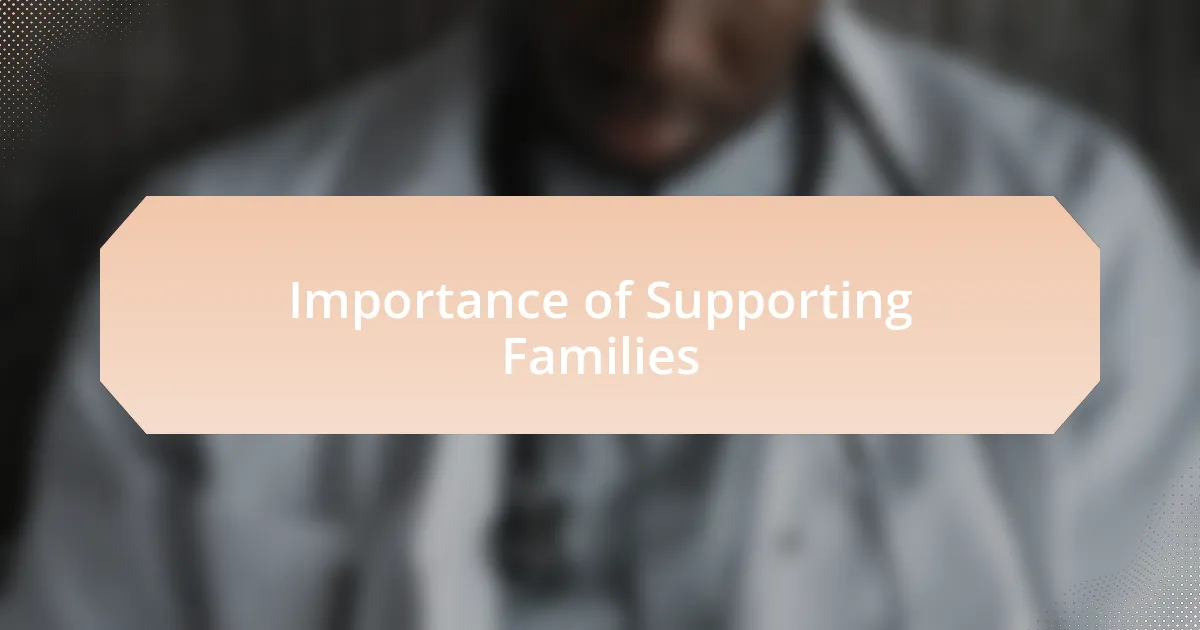
Importance of Supporting Families
Supporting families in crisis is essential for fostering resilience during some of life’s most challenging moments. When I think back to the countless times I’ve witnessed families gather in the face of uncertainty, it’s clear that emotional support can awaken strength they didn’t know they had. Have you ever seen how a shared hug or a reassuring word can ignite hope? This simple human connection can be the foundation that helps families navigate their fears.
Moreover, providing support to families goes beyond just emotional care; it creates a network of understanding that is crucial for their healing process. I recall a family who felt isolated during their loved one’s long hospital stay. During our conversations, I introduced them to other families facing similar challenges. The relief on their faces was tangible, as if a weight had been lifted. In those moments, it became evident that together, they could weather their storms more effectively.
Ultimately, families supported in crisis feel empowered to engage in their loved ones’ care more actively. I’ve seen firsthand how knowledge and encouragement can make them advocates for their loved ones’ needs. Isn’t it remarkable how the act of simply being there can turn fear into action? When families know they are not alone, they find the courage to stand strong, ensuring that each step forward is a step towards healing.
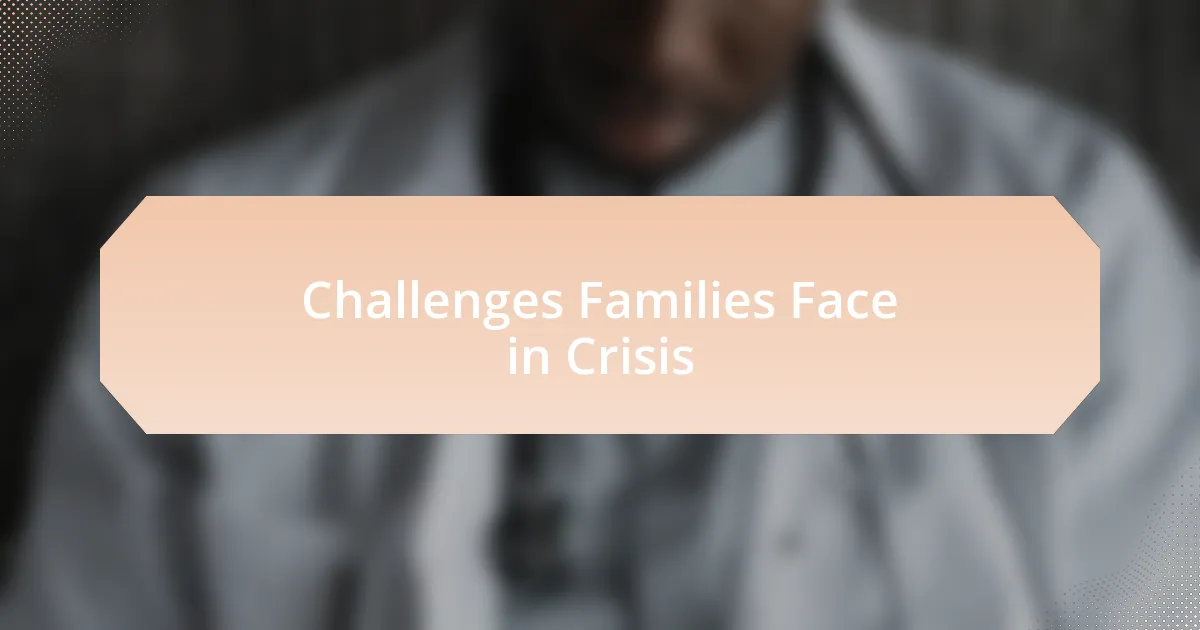
Challenges Families Face in Crisis
Families in crisis encounter a myriad of challenges that can leave them feeling overwhelmed. In my experience, one of the most significant hurdles is the emotional turmoil that often goes unacknowledged. Picture a family sitting in a sterile hospital waiting room, anxiety etched on their faces. I’ve noticed how the weight of uncertainty can lead to arguments and blame among loved ones, as each struggles to cope with their fear in different ways. How can we support each other when we’re all grappling with our pain?
Additionally, practical challenges often compound the emotional strain. For instance, I’ve seen families juggling work commitments, childcare, or financial concerns while trying to be present for their loved one. It’s like walking on a tightrope. I remember a mother who was torn between staying with her ailing child and managing her other children at home. The guilt she felt was palpable, making it difficult for her to focus on what truly mattered. Isn’t it heartbreaking when the demands of everyday life overshadow the need for emotional presence?
Finally, the isolation that families frequently face can be devastating. When I reflect on the individuals who come to the hospital alone, sharing their stories can feel like a lifeline, yet many still hesitate to reach out. I often think about a father who fought against the urge to stay silent, fearing that no one else understood his grief. The reality is that connection can be a powerful antidote to the loneliness they endure. How can we create a community that encourages families to open up and share their burden so that they don’t have to face their trials alone?
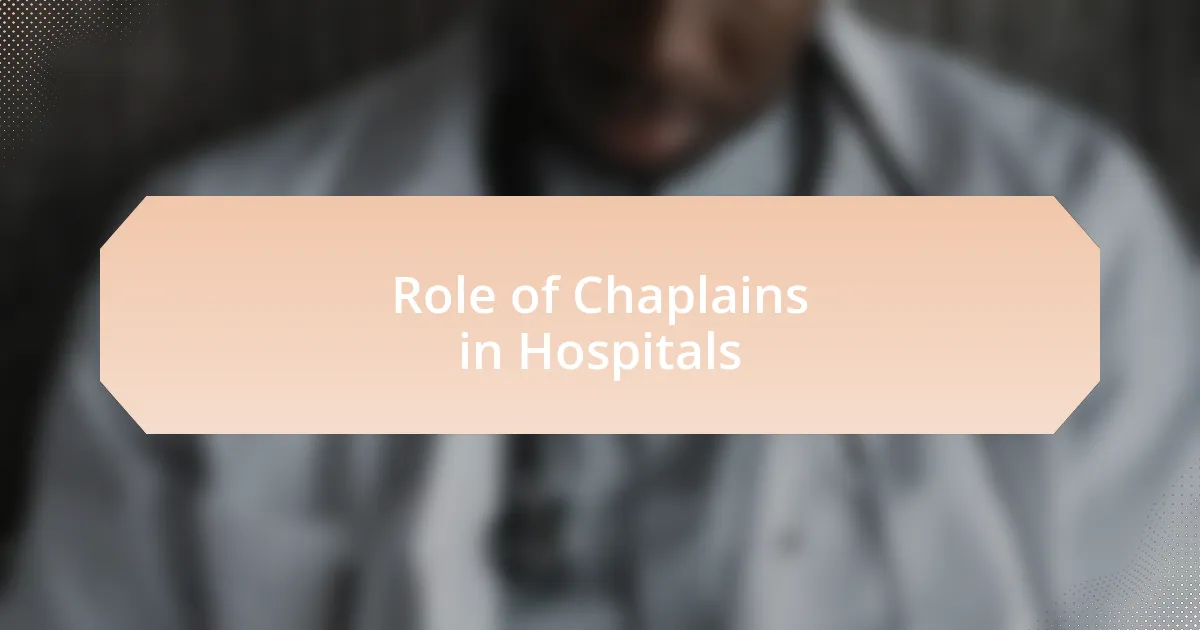
Role of Chaplains in Hospitals
Chaplains play a vital role in hospitals, serving as confidants and spiritual guides during some of life’s most challenging moments. I’ve witnessed firsthand how these compassionate individuals offer a comforting presence when families need it most. For instance, when a mother I know received devastating news about her child’s health, the chaplain was there within moments, providing not just prayer but also a listening ear and reassurance that she wasn’t alone.
In my journey, I’ve seen chaplains bridge the distance between medical expertise and emotional healing. They are often the ones who facilitate difficult conversations, helping families navigate their fears and uncertainties with grace. There’s something profoundly uplifting about the way a chaplain can transform a cold waiting room into a space of warmth and understanding. It makes me ask, how often do we underestimate the power of spiritual care in the face of crisis?
Additionally, chaplains have the unique ability to offer rituals and traditions that bring solace in moments of despair. I remember a time when a family was grappling with the decision to remove their loved one from life support. The chaplain led a small ceremony that allowed them to honor their loved one’s life, helping them find closure amidst the chaos. Isn’t it remarkable how these moments can foster healing and connection, even as families face the toughest choices?
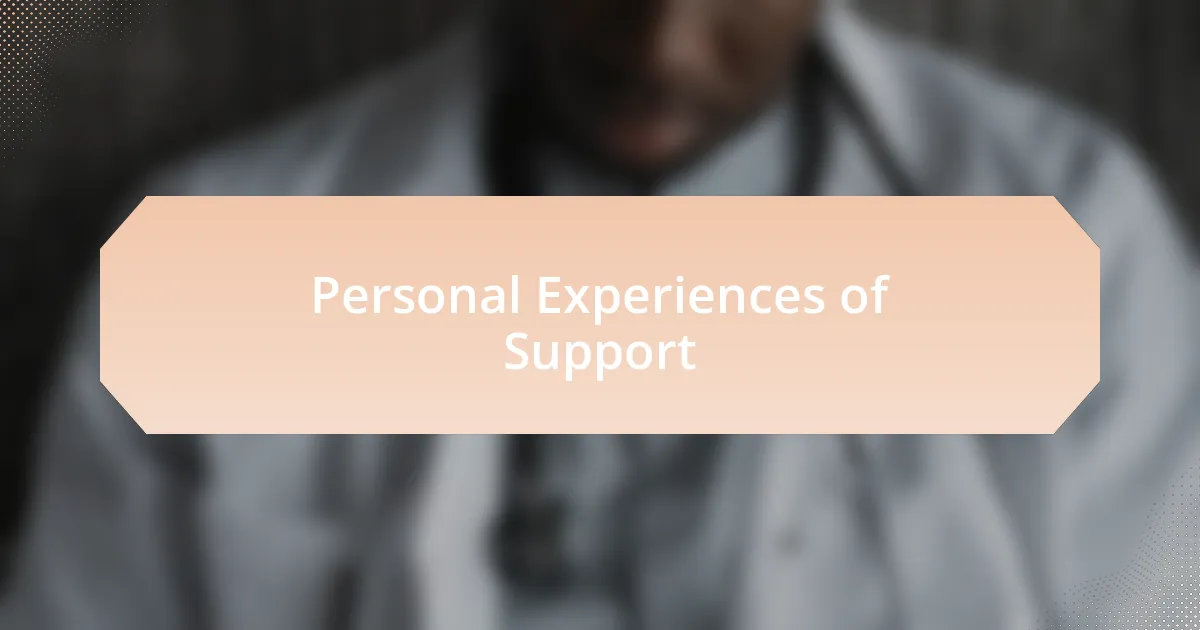
Personal Experiences of Support
I’ve often found that the emotional support offered by chaplains can make a significant difference in how families cope with crisis. Once, I accompanied a chaplain who sat with a father whose child was in surgery. The raw fear in the father’s eyes was palpable, yet the chaplain’s gentle reassurance and empathic listening seemed to slowly lift some of that weight. During those moments, I could see how vital it is to have someone there who understands not just the situation, but also the emotional turmoil involved.
Another experience stands out in my memory—when a family was confronted with end-of-life decisions. The chaplain’s presence was crucial; they facilitated a space where siblings could express their feelings, fears, and love for one another. It was touching to witness how the chaplain guided them in sharing memories and tears, transforming a heartbreaking moment into one of connection and understanding. I often wonder, how do we find the strength to navigate these deeply challenging situations alone?
In one particular instance, I watched a chaplain light a candle for a patient who had just passed away. It was a simple gesture, but it spoke volumes about reverence and remembrance. The family gathered around, seeking some form of peace, and together they shared stories that turned their grief into a celebration of their loved one’s life. This experience left me thinking about the powerful role of ritual in healing—why do we often overlook the importance of such traditions when facing loss?

Strategies for Effective Family Support
One effective strategy I’ve found is fostering open communication among family members. For instance, in a situation where siblings were struggling to support one another after a parent’s diagnosis, I encouraged them to share not just their concerns but also their memories and fears. This simple act of sharing allowed them to feel more connected, reducing feelings of isolation during a difficult time. It’s amazing what can happen when families choose to openly talk about their emotions.
I’ve also seen great success with creating a supportive environment by incorporating shared activities. For example, during a particularly challenging time for a family, I organized a small gathering where they could share a meal and reflect on positive moments. This not only created an opportunity for laughter amidst the pain but also strengthened their bonds. Have you ever noticed how a simple meal can turn into a powerful healing ritual? It’s often in these moments of togetherness that families can find respite from overwhelming stress.
Another critical strategy is providing practical resources alongside emotional support. When families are navigating hospital systems, the added stress of logistical challenges can be overwhelming. During one visit, I helped a family understand the processes for patient care and available resources. It was rewarding to see their anxiety lessen as they gained clarity. Have you ever felt the weight lifted just by having your questions answered? Practical support, paired with compassion, can truly empower families in crisis.
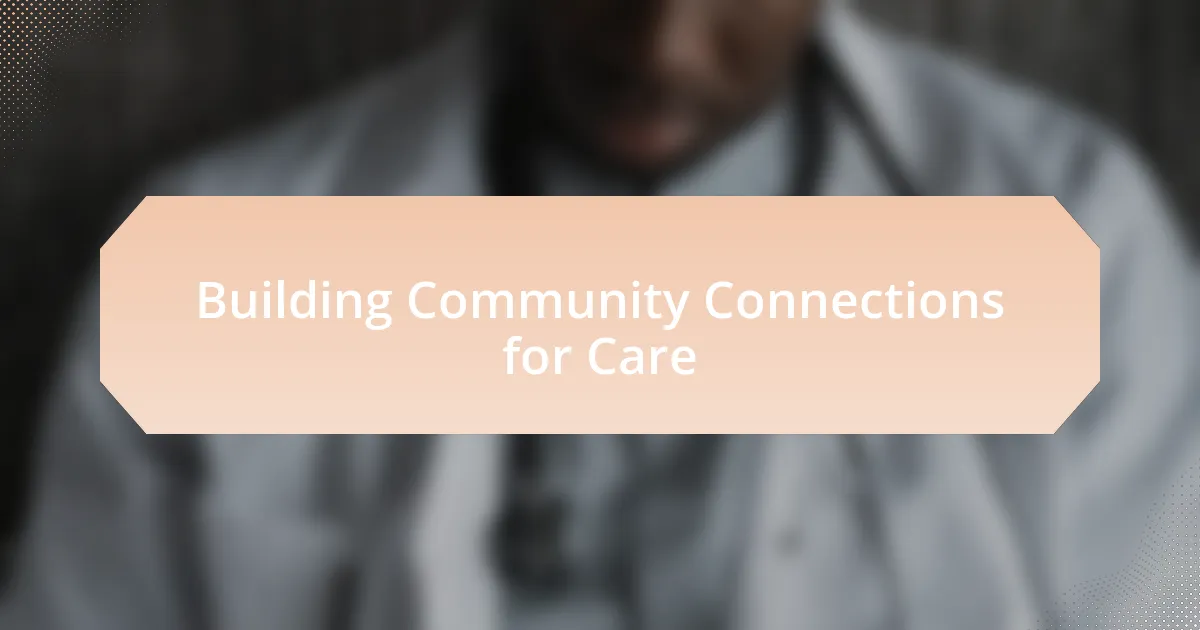
Building Community Connections for Care
Building strong community connections is essential for providing holistic care to families in crisis. I remember a time when a local church community organized a support group for families dealing with chronic illness. The warmth and understanding shared among participants created a safe space where they felt seen and heard. Have you ever experienced that sense of belonging when surrounded by those who understand your struggles? It’s in these gatherings that the power of community truly shines.
Another poignant moment I experienced was collaborating with local businesses to provide meals for families navigating the emotional turmoil of a loved one’s hospitalization. I witnessed how a shared meal not only nourished them physically but also sparked conversations and laughter. It’s incredible how a small action, like a meal delivery, can transform a family’s experience into one of love and support. Isn’t it heartening to think that communities can rally together to lighten someone else’s burden?
Moreover, establishing partnerships with local organizations can enhance the resources available to families in need. During my time supporting a family at the hospital, I connected them with a community service that provided free counseling. This resource became a lifeline, allowing them to express their feelings in a constructive environment. Have you ever found solace in professional guidance when facing a storm? Community connections can bridge the gap between families and the support they desperately need, turning isolation into a sense of unity and hope.